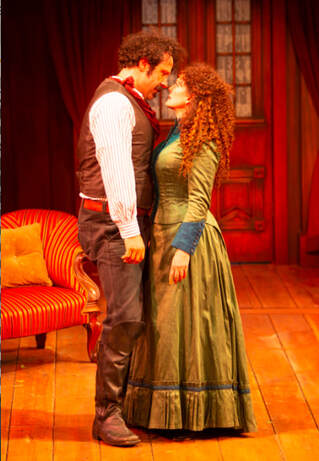In its complete form Shakespeare’s play is a tale of abuse of power, manipulation and control aimed at both sexes.
A local Lord happens upon a drunkard sleeping on the cold, hard ground and conspires to mess with his mind in order to manipulate him into behaving in a manner that is both pleasing and entertaining to all who witness. Once he is sufficiently controlled he is then subjected to endure a theatrical performance of a tale where its female protagonist is placed in a mirrored position of objectification. The drunkard, rather than finding mirth in the protagonist’s predicament, is stultified and bored, and promptly falls asleep. He is awoken and urged to follow the tale more closely and it is here where the Lord’s jest comes to light: ridicule of the downtrodden is a tolerable pastime for the privileged alone.
Anderson has made significant changes to the text, altering the storyline to reflect a more contemporary outcome. The action is set in the 1870s where the Italian city of Padua shifts to the American Wild West. Her rendition eliminates the storyline of the drunkard and opens with the theatrical performance as a freestanding play. It is a risky choice as with no male counterpoint the focus rests on the struggle of the female protagonist alone. It is a choice that will require ingenuity to keep it from falling into cliché.
However, Lucentio isn’t the only one lusting after the attentions of fair Bianca. Gremio (Scott Bellis), an older gentleman, and the much younger Hortensio (Anton Lipovetsky), wage a war of material one-upping until the arrival of Lucentio changes the game and fresh tactics are required.
In a fit of exasperation Bianca’s mother, Madam Baptista (Susinn McFarlen), locks Bianca away until her elder, cantankerous sister Katharina/Kate (Jennifer Lines) can first be married. Until that happens the only people allowed access to Bianca are her tutors.
Enter Petruchio (Andrew McNee). Here Petruchio is no longer a rich, manipulative world-travelled heir in search of a worthy wife, but a quirky, penniless vagabond in search of a wife with a dowry and an attractive temperament. Petruchio encounters his old friend Hortensio and discovers his predicament. He is both eager to help Hortensio win his beloved Bianca, and enchanted with the notion of winning such a virulent woman as Kate for himself. Anderson switches out the malevolent manipulation of Kate for a raucous and amusing battle of wits when Petruchio naively pits himself against the sharp-tongued Kate.
Meanwhile, in an attempt to gain access to lovely Bianca, Lucentio conspires with Tranio, Hortensio with Petruchio and, in typical Shakespearean fashion, identities are altered as suitors become tutors. Once secured inside the homestead Lucentio and Hortensio rally to outsmart each other. Lipovetsky provides much of the comedy as the hapless Hortensio and is so fluid with humour that when he legitimately has trouble with his moustache on stage, he manages to fit the struggle into the mannerisms of the character to the audience’s great amusement.
Eventually both women are well matched and partnerships are earned rather than taken. The story is a bit convoluted, and at times scattered, but the moments that work, work well. Anderson has clearly changed the tone of the play but it is her reconfiguration of the infamous ending that lassos the outcome of its heroine and ties off the storyline with an inspiring twist.
The Taming of the Shrew runs until September 21, 2019.
Click HERE for a link to tickets.



 RSS Feed
RSS Feed
